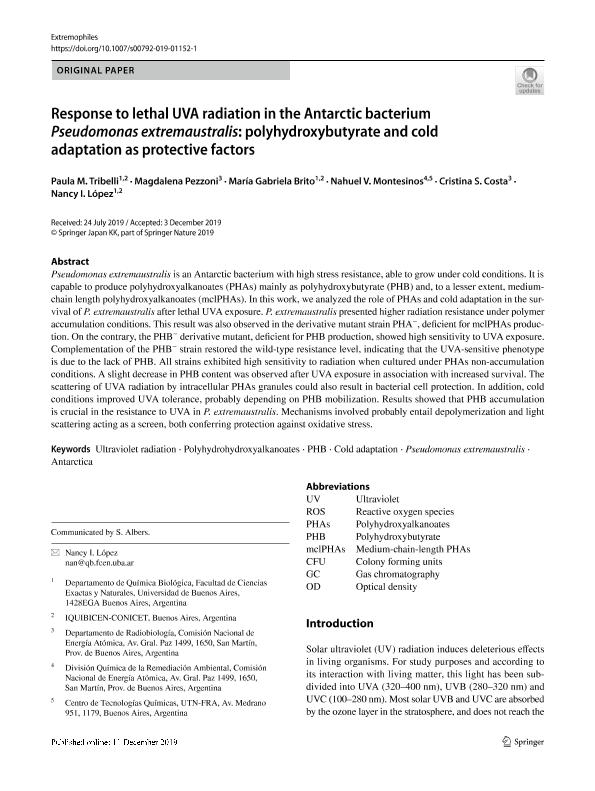Artículo
Response to lethal UVA radiation in the Antarctic bacterium Pseudomonas extremaustralis: polyhydroxybutyrate and cold adaptation as protective factors
Tribelli, Paula Maria ; Pezzoni, Magdalena
; Pezzoni, Magdalena ; Brito, María Gabriela
; Brito, María Gabriela ; Montesinos, Victor Nahuel
; Montesinos, Victor Nahuel ; Costa, Cristina Susana; López, Nancy Beatriz
; Costa, Cristina Susana; López, Nancy Beatriz
 ; Pezzoni, Magdalena
; Pezzoni, Magdalena ; Brito, María Gabriela
; Brito, María Gabriela ; Montesinos, Victor Nahuel
; Montesinos, Victor Nahuel ; Costa, Cristina Susana; López, Nancy Beatriz
; Costa, Cristina Susana; López, Nancy Beatriz
Fecha de publicación:
12/2019
Editorial:
Springer Tokyo
Revista:
Extremophiles
ISSN:
1431-0651
Idioma:
Inglés
Tipo de recurso:
Artículo publicado
Clasificación temática:
Resumen
Pseudomonas extremaustralis is an Antarctic bacterium with high stress resistance, able to grow under cold conditions. It is capable to produce polyhydroxyalkanoates (PHAs) mainly as polyhydroxybutyrate (PHB) and, to a lesser extent, medium-chain length polyhydroxyalkanoates (mclPHAs). In this work, we analyzed the role of PHAs and cold adaptation in the survival of P. extremaustralis after lethal UVA exposure. P. extremaustralis presented higher radiation resistance under polymer accumulation conditions. This result was also observed in the derivative mutant strain PHA−, deficient for mclPHAs production. On the contrary, the PHB− derivative mutant, deficient for PHB production, showed high sensitivity to UVA exposure. Complementation of the PHB− strain restored the wild-type resistance level, indicating that the UVA-sensitive phenotype is due to the lack of PHB. All strains exhibited high sensitivity to radiation when cultured under PHAs non-accumulation conditions. A slight decrease in PHB content was observed after UVA exposure in association with increased survival. The scattering of UVA radiation by intracellular PHAs granules could also result in bacterial cell protection. In addition, cold conditions improved UVA tolerance, probably depending on PHB mobilization. Results showed that PHB accumulation is crucial in the resistance to UVA in P. extremaustralis. Mechanisms involved probably entail depolymerization and light scattering acting as a screen, both conferring protection against oxidative stress.
Archivos asociados
Licencia
Identificadores
Colecciones
Articulos(CCT - PATAGONIA NORTE)
Articulos de CTRO.CIENTIFICO TECNOL.CONICET - PATAGONIA NORTE
Articulos de CTRO.CIENTIFICO TECNOL.CONICET - PATAGONIA NORTE
Articulos(IQUIBICEN)
Articulos de INSTITUTO DE QUIMICA BIOLOGICA DE LA FACULTAD DE CS. EXACTAS Y NATURALES
Articulos de INSTITUTO DE QUIMICA BIOLOGICA DE LA FACULTAD DE CS. EXACTAS Y NATURALES
Citación
Tribelli, Paula Maria; Pezzoni, Magdalena; Brito, María Gabriela; Montesinos, Victor Nahuel; Costa, Cristina Susana; et al.; Response to lethal UVA radiation in the Antarctic bacterium Pseudomonas extremaustralis: polyhydroxybutyrate and cold adaptation as protective factors; Springer Tokyo; Extremophiles; 24; 2; 12-2019; 265-275
Compartir
Altmétricas



